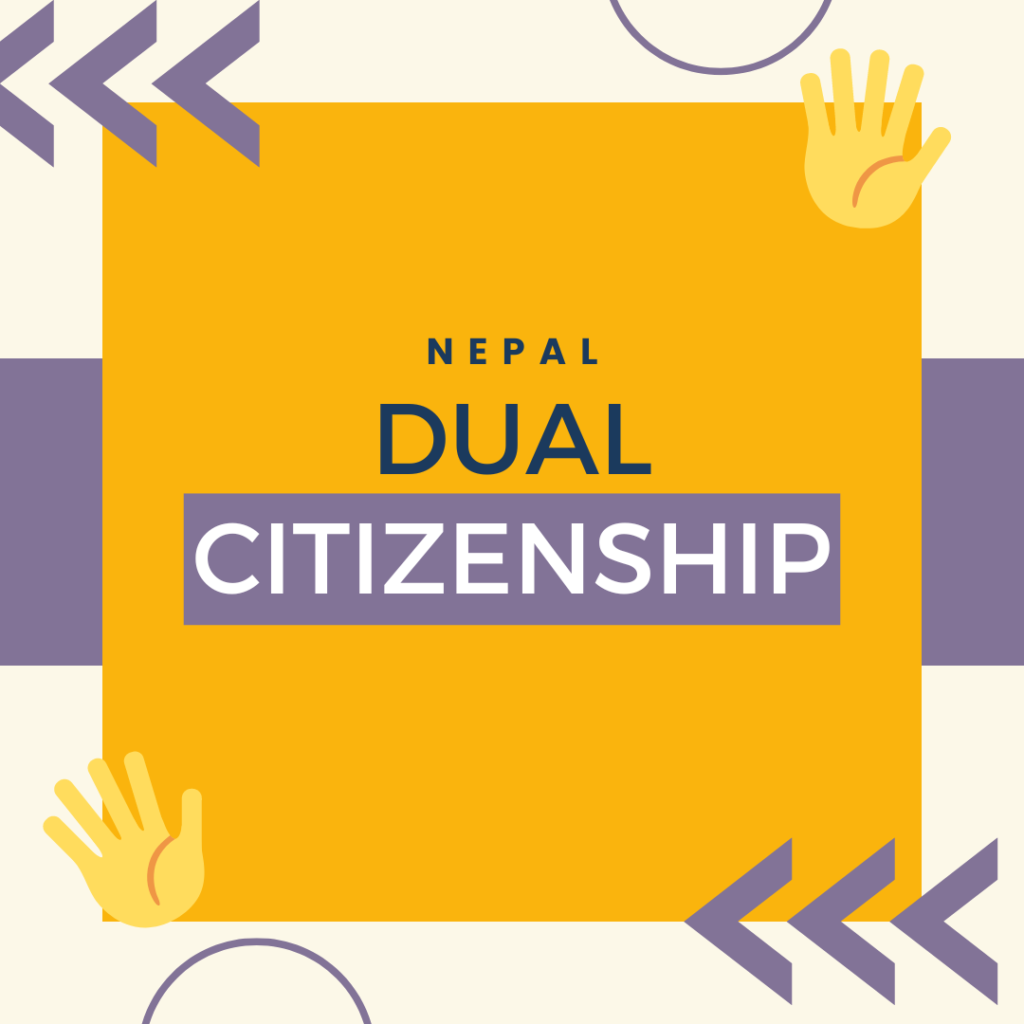The issue of dual citizenship for Nepali citizens has been a topic of discussion and debate for several years. As Nepal’s diaspora continues to grow, many Nepalis living abroad advocate for dual citizenship to maintain a connection with their homeland while enjoying the rights of citizens in their adopted countries. This essay will explore the pros and cons of dual citizenship, the current legal framework in Nepal, and its potential implications on the country’s economy, politics, and national identity.
Current Legal Framework in Nepal
Nepal does not currently allow dual citizenship under its Constitution of 2015. The Nepali law mandates that individuals must renounce their Nepali citizenship if they obtain citizenship from another country. This means that Nepali immigrants, who may have spent decades abroad and acquired foreign citizenship, are no longer legally recognized as Nepali citizens. However, the constitution does allow for Non-Resident Nepali (NRN) citizenship, which provides limited rights, such as the ability to own property and invest, but without full voting or political rights.
The question of granting dual citizenship remains unresolved despite pressure from the Non-Resident Nepali Association (NRNA) and other advocacy groups, who argue that dual citizenship could benefit both the diaspora and Nepal itself.
Pros of Dual Citizenship for Nepali
- Economic Growth and Investments: Dual citizenship could potentially lead to a surge in foreign investments. Nepalis living abroad often seek to invest in their homeland and providing them with dual citizenship would ease bureaucratic hurdles. They would feel more secure about their investments, as they would have legal protections and rights as Nepali citizens. In fact, remittances from Nepali workers abroad account for a significant portion of the nation’s GDP, and dual citizenship could further enhance this economic contribution.
- Strengthening National Identity: Allowing dual citizenship could strengthen national identity by enabling the diaspora to maintain a stronger connection with their homeland. Many second-generation Nepalis, born in foreign countries, feel a cultural connection to Nepal but lose their citizenship when they acquire foreign citizenship. Dual citizenship could allow these individuals to retain their Nepali identity while fully participating in their new countries.
- Contributions in Skilled Labor: Dual citizenship could encourage skilled professionals from the Nepali diaspora to return and contribute to the country’s development. Professionals in fields such as education, healthcare, technology, and business could bring back skills and expertise, which would benefit the local economy and help develop sectors that lack adequate human resources.
Cons of Dual Citizenship for Nepali
- National Security Concerns: Critics of dual citizenship often raise concerns about national security. There is a fear that allowing dual citizenship could lead to divided loyalties, where citizens may prioritize the interests of their second country over Nepal. Additionally, Nepal’s geopolitical positioning between India and China adds to the sensitivity of this issue.
- Potential Strain on Resources: Nepal is a developing country with limited resources, and there are concerns that allowing dual citizenship could strain the country’s infrastructure and social services. There could be a scenario where dual citizens, residing abroad, claim benefits and services meant for residents without contributing much to the nation’s tax system.
- Political and Legal Complexities: Introducing dual citizenship would require significant changes to the legal and political framework. This might lead to complex issues regarding the rights and obligations of dual citizens, especially in areas such as taxation, voting rights, and national defense. The government would need to create clear guidelines on how these issues would be handled.
The Road Ahead
As Nepal continues to modernize and expand its global footprint, the debate over dual citizenship is expected to intensify. Countries like India and China, which also have large diasporas, have approached this issue with caution. India, for example, does not offer dual citizenship but allows Overseas Citizenship of India (OCI), which grants certain rights without full citizenship. Nepal could consider a similar approach, expanding on the existing NRN framework to offer more rights without full citizenship.
Non-Resident Nepali (NRN) citizenship
However, Nepal offers a Non-Resident Nepali (NRN) citizenship option, which provides limited rights such as the ability to own property and invest in Nepal, but it does not grant full citizenship rights, including voting or running for political office.
Here’s a summary of the current situation:
- Non-Resident Nepali (NRN) Citizenship:
- This option is available to people of Nepali origin who have obtained citizenship in another country but want to maintain a formal connection with Nepal.
- NRN citizenship allows holders to own property and invest in Nepal but doesn’t grant political or voting rights.
- Advocacy for Dual Citizenship:
- The Non-Resident Nepali Association (NRNA) and other groups have been pushing for the introduction of dual citizenship, arguing that it would allow Nepalis living abroad to maintain stronger ties with their homeland while contributing economically and socially to the country.
Since dual citizenship is not available, those who obtain foreign citizenship must follow the legal process of renouncing their Nepali citizenship and then apply for NRN status if they wish to maintain some rights in Nepal.
If Nepal’s laws change in the future to allow dual citizenship, a formal process will likely need to be established through constitutional amendments or legislation. Until then, the path for Nepalis living abroad is through the NRN citizenship option.
Conclusion
The issue of dual citizenship for Nepalis touches upon various dimensions—economic, political, and cultural. While it offers the potential for economic growth and stronger diaspora ties, it also brings challenges related to national security, resource allocation, and legal complexities. The government must carefully weigh these factors before making any decisions. As Nepal’s diaspora continues to grow, dual citizenship remains a complex but essential debate for the country’s future.
Allowing dual citizenship could potentially unlock new avenues for development, but it requires careful consideration and planning to ensure that Nepal’s national interests are safeguarded.




Pingback: Rights of Non-Resident Nepali (NRN) - veshraj.com Rights of Non-Resident Nepali (NRN)